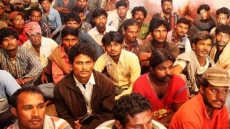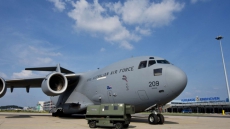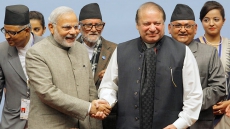NEW YORK — Canada joined Israel, the United States and six other countries Thursday to vote against a resolution in the U.N. General Assembly to allow the Palestinians and Holy See to raise their flags at U.N. headquarters.
The symbolic step pursued by the Palestinians in their quest for an independent state saw 119 nations vote "yes" and 45 abstain.
The resolution allows non-member observer states to raise their flags alongside those of the 193 U.N. member states. The Palestinians and the Vatican are the only two observers, but the Holy See has backed away from the effort, saying it will not raise its flag before Pope Francis visits the U.N. later this month.
With Israeli-Palestinian peace negotiations stalled and little prospect of a two-state solution emerging, the Palestinians have successfully pursued symbolic recognition as a state at the United Nations — winning General Assembly approval in late 2012 to raise their status from an observer to a non-member observer state, by a vote of 138 in favour and nine against. That has allowed the Palestinians to join U.N. bodies, including its cultural organization UNESCO, and many international treaties, including the Rome Statute that established the International Criminal Court.
Riyad Mansour, the Palestinian U.N. ambassador, hailed the "historic vote," calling it "another step towards fulfilment of the promise of independence made to the Palestinian people nearly seven decades ago."
He said last week that the Palestinians would like President Mahmoud Abbas to raise their flag after he addresses the General Assembly's annual gathering of world leaders Sept. 30.
"Of course we know that raising our flag will neither end the (Israeli) occupation nor solve the conflict immediately," Mansour said. "But raising the flag will signal to our people everywhere ... that their freedom is inevitable, and the international community supports them in their journey for justice."
Israel's U.N. Ambassador Ron Prosor called the goal of the resolution "a photo op," saying it will not advance prospects for peace, but in his final speech at the United Nations he looked forward to that day.
"History proves to us that negotiations can be fruitful, that peace is possible, and that we can create a new reality for the people of the region," he said. "I look forward to seeing the image of an Israeli prime minister and a Palestinian leader standing side by side, raising the flags of our two peoples, living together in peace. That will be a photo truly worth taking."
Mansour called the resolution "a contribution to the international effort to salvage the two-state solution" and expressed hope that "we may see the day when the state of Palestine and the state of Israel live side by side in peace, coexistence and security, and sharing the bonds of a new era in our region and in our global community."
While General Assembly resolutions are not legally binding, the United Nations has said it will be guided by the vote. The resolution allows 20 days for implementation and holes for additional flagpoles already exist.
The Palestinians' supporters had hoped that no nation would block the proposal and risk offending the Vatican on the eve of Pope Francis' first U.S. and U.N. visit. But the Holy See asked that it not be named in the resolution.
Archbishop Bernardito Auza, the Vatican's U.N. ambassador, told the assembly after the vote that "the Holy See has always respected the 70-year practice and tradition of the United Nations that there are only flags of member states that are flown at the United Nations." But he said it didn't object to the Palestinian proposal and respects the assembly's decision.
He told reporters Wednesday that "we have generally different priorities," and while he ruled out raising the Vatican flag before the pope's Sept. 25 visit, he left open the possibility that it might fly at U.N. headquarters sometime in the future.
Some 135 countries — the vast majority in Asia, Africa and Latin America — have recognized a state of Palestine. In May, the Holy See added its recognition, and Auza reiterated the Vatican's support for a two-state solution.
The United States and Israel oppose recognizing a Palestinian state, arguing that it undermines efforts to negotiate a peace agreement.
"Our vote reflects the reality that the parties themselves must ultimately take the constructive, responsible steps required to achieve a two-state solution and end the cycle of violence and suffering that has persisted for far too long in the Middle East," U.S. Ambassador Samantha Power told the General Assembly just before the vote.
Australia and several small island states also voted "no." Europe was divided with France, Italy, Spain, Sweden and Poland among those voting "yes" while Britain, Germany, the Baltic states and others abstained.





